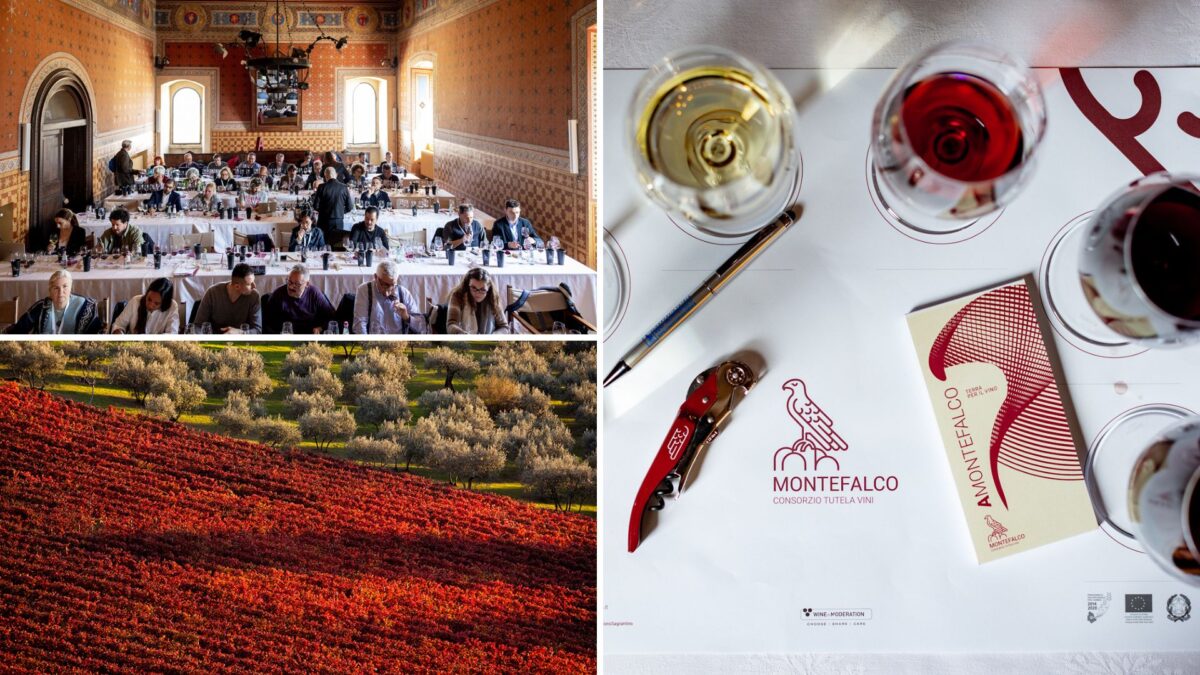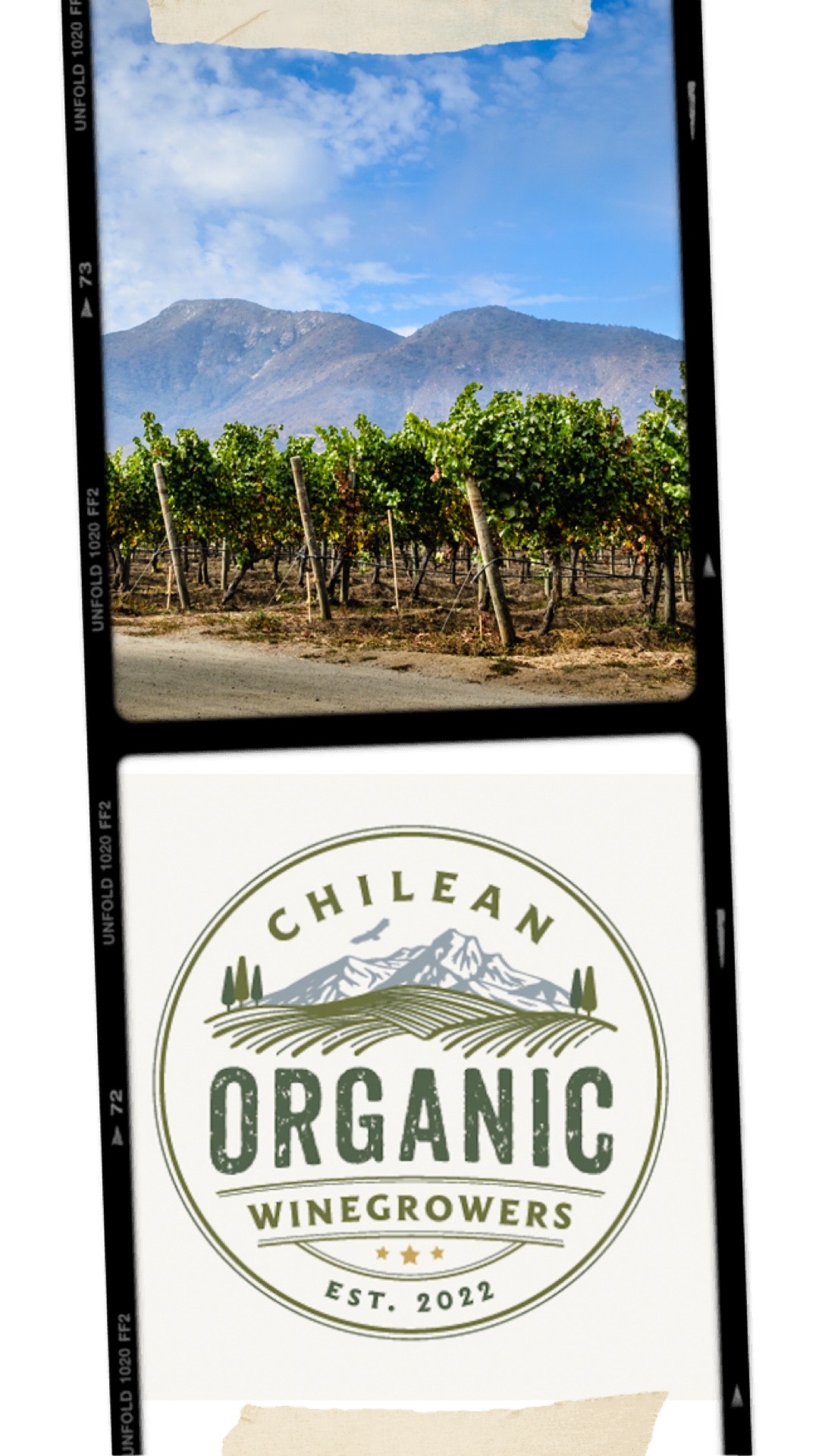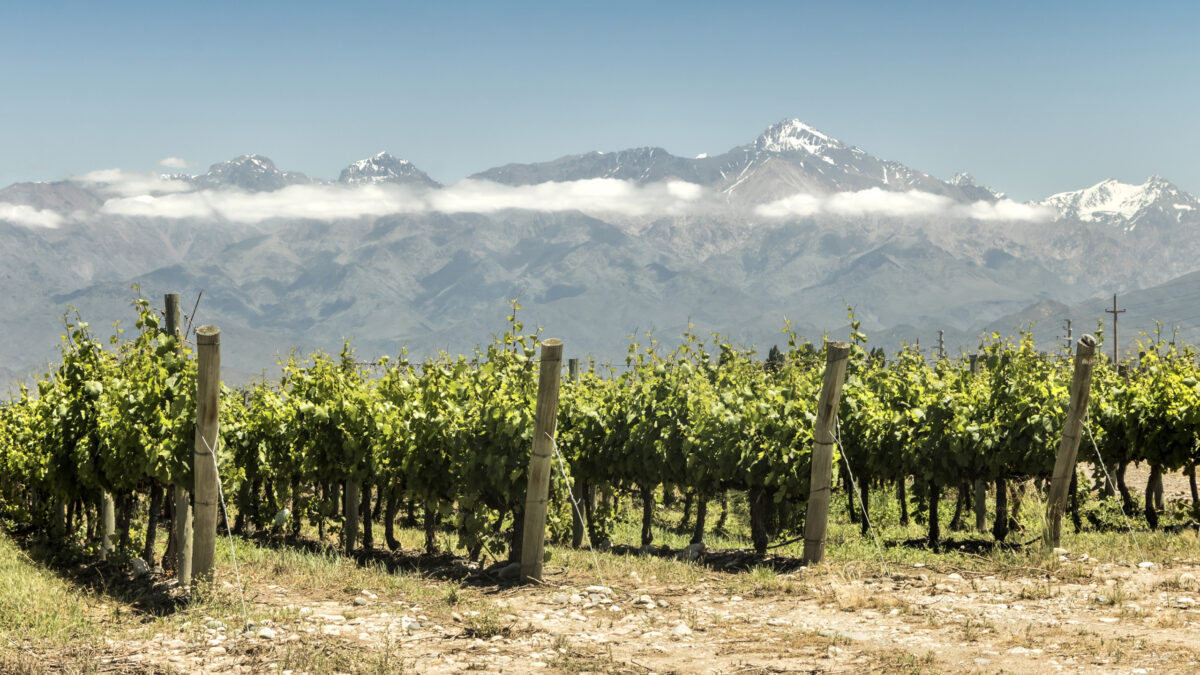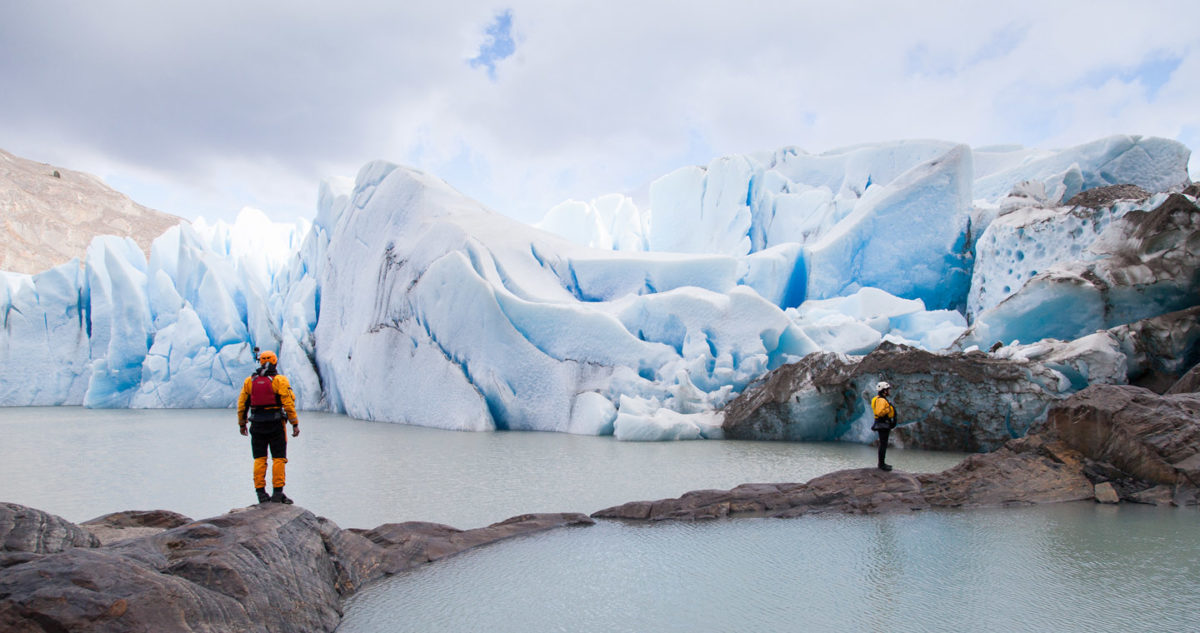One of Italy’s most unique native varieties, and Umbria’s flagship grape “Sagrantino” was showcased on April 19th and 20th in the charming town of Montefalco at the 2023 Anteprima Sagrantino. The Anteprima Sagrantino is an opportunity each year for wine professionals to rediscover this symbol of Umbria’s heritage. This year was the release of the 2019 vintage of Montefalco di Sagrantino DOCG which requires 3 years+ of aging before it can be released onto the market. Although it always takes centre stage, it is surrounded by the reputed neighbours: Montefalco Bianco DOC, Montefalco Grechetto DOC, Spoleto Trebbiano Spoletino DOC, Spoleto Trebbiano Spoletino Superiore DOC, Montefalco Rosso DOC, and Montefalco
Rosso Riserva DOC.
The town hall of Montefalco, also known as “Ringhiera dell’Umbria” or railings of Umbria for its perched position overlooking the countryside, was transformed into a magnificent tasting room that welcomed Italian and international press. Since 2015 the Consorzio Tutela Vini Montefalco has organized this event in the village of Montefalco.
A New Vision for Montefalco
This year the Consortium presented a new initiative that shifts the focus from “Anteprima Sagrantino” to “A Montefalco”. This new name represents a change in perspective that offers a more holistic expression of Montefalco as a “Land of Wine”. No longer just Sangrantino or an Anteprima event, “A Montefalco” is meant to show visitors the evolution of the numerous native varieties in addition to Sagrantino that the region expresses today.
Sustainability is another important theme of the event. The Consortium launched its “Sangreentino” initiative that provides electric cars and bikes to transport visitors to the wineries and on other tours. The project plans for 30 charging points to be available at different wineries. In addition, 31% of wineries have received or are transitioning to organic and biodynamic certifications. Their sustainability practices also include solar systems, biomass boilers, botanical gardens and ecological corridors to protect bees and promote biodiversity.
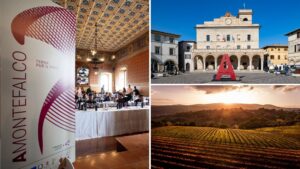
Montefalco – Land of Wine
Montefalco lies in the heart of Italy surrounded by hilltop vineyards and historic villages. Its character is defined by its authenticity and unique terroir. As a part of the country’s only landlocked region its rivers, lakes and hills provide a variety of elevations and soils. Add to that its Mediterranean climate, and the result is wine with balance, depth and complexity. Most of the grapes grown here are native and have been thriving for over a thousand years. And of course, one grape has become a symbolic expression of the Montefalco terroir “Sagrantino”.
Sagrantino and the other grape varieties of Montefalco
Sagrantino is inextricably linked to Montefalco’s past and future. The name is said to be derived from ‘falco sagro” or ‘sacred falcon’. Legend recounts that in the 13th century Sagrantino wine was used to cure the dying falcons in the area much adored by the emperor Federico. Perhaps not a coincidence then that this would become the most famous wine from Montefalco or “Falcon’s Mountain’. In 1992 Montefalco Sagrantino was
awarded DOCG status. Sagrantino was traditionally made in a sweet ‘passito’ style but its dry version has now earned it a place among Italy’s best red wines. This thick-skinned grape is low yielding with a lot of tannin, structure and intensity which also gives it excellent aging potential. This tannic power is harnessed through the required aging process for DOCG certification.
But as the Montefalco wine producer’s Consortium demonstrates in its inclusive approach to promoting the wines of Montefalco, Sangrantino is just one of several local grape varieties to be discovered. For example, Trebbiano Spoletino and Grechetto are among the white wines that should not be missed. Trebbiano Spoletino can be surprisingly rich and structured with both fruity and savoury elements that are delivered with refreshing
acidity. There are also Sangiovese-based reds produced under the Montefalco Rosso DOC. These can vary from fresh and fruity with herbaceous undertones to more structured wines aged in barrique. You can find reds and whites alike in a dry style or sweet made in
the ‘passito’ method.
The Epicentre of wine tourism in Umbria
Montefalco has been known as the “Land of Wine” since the Middle Ages.
Evidence that vines were present in the area date back to 1088. These native grape varieties have evolved in harmony with local traditions and culture making this land of wine an incredible place for wine enthusiasts to visit. The region has seen rapid growth of small, dynamic estates over the past decade. They are supported by the Consortium and the combined determination of the local hospitality, restaurants, heritage sites and fellow
wineries to promote the area and its great qualities, especially after the pandemic.
The ‘Associazione Strada del Sagrantino’ is one of the main bodies promoting tourism along the wine road to these five towns: Montefalco, Bevagna, Castel Ritaldi, Giano dell’Umbria and Gualdo Cattaneo. Not only do they all have deep rooted wine traditions, but they also offer rich history, beautiful architecture, and tasty local specialties. For example, the
Museum of Montefalco is a treasure trove of art and a reference point for Umbrian history, tradition and painting. The Rocca Sonora is a fortress that stands in the main square of Gualdo Cattaneo as an emblem of the territory’s fortified defence system. San Francesco Church in Giano dell’Umbria has some incredible frescoes by the reputed painter
Giovanni di Corraduccio. And the uniquely shaped Piazza Filippo Silvestri in Bevagna is one of Umbria’s most attractive medieval squares.
Here is a selection of wineries to visit with memorable tasting experiences and many lodging options:
Scacciadiavoli
A landmark estate in Montefalco, Azienda Agraria Scacciadiavoli has been producing wine since 1884 and was bought by the Pambuffetti family in 1954. The name means “cast out the devils”, taken from a local 19th century exorcist who was known to use wine while mperforming his rituals. Today the winery is a state-of-the-art four-level facility allowing for gravity flow throughout the entire production. Winery visits consist of a guided tour and
different tastings to choose from paired with Pambufetti family products or even lunch.
Scacciadiavoli – Montefalco Grechetto Doc 2022
Brilliant, yellow colour. Intense flavour of ginger with a scent of apricot.
Fresh, balanced palate with good persistence. The acidity matches well with the fruit. I enjoyed it!
Pard
Founded in 1919 by three brothers, Alfredo, Francesco, and Alberto. The brothers commenced making wine in the local hospital in Montefalco. Eventually, their wines were exported throughout Italy, including the Vatican. Today their great-grandsons Gianluca Rio and Alberto
Mario kept the family tradition alive. With their 11 hectares of vines, they grow the local varieties Sagrantino, Sangiovese, Grechetto and Trebbiano Spoletino, but also international grapes like Merlot, Cabernet and Chardonnay.
Le Cimate
Le Cimate winery is the culmination of over 200 years of dedication to agriculture by the Bartolini family. From farming in the 1800’s to viticulture in the 1960’s and then the strategic purchase of land in 1992, the family started to build their winery in 2011. Three generations contributed to its construction, including Grandfather Paolo who was President of the local community winery Colli Spolentini for more than 20 years. The
location at 400m nestled against the Martani Mountains provides an excellent diurnal shift in temperatures with regular winds to keep the vines healthy. Surrounding their 23 hectares of vineyards are 33 hectares of olive groves and 15 hectares of hazelnut orchards. The winery benefits from the latest technology and produces wines from an impressive array of grapes, both native varieties and international favourites such as Chardonnay, Viognier, Vermentino, Merlot and Cabernet Sauvignon.
Tabarrini
Giampalo Tabarrini is the fourth generation who took control of his family’s agricultural estate in the late 1990’s and transformed it into the winery that it is today. His vision is thoroughly focused on terroir. Three of their bottlings are selected from distinct parcels among the vineyards to highlight their unique expression. In addition to their 15 hectares of vineyards they have olive groves and wheat fields from which they produce their own stone-ground flour perfect for making pizza, pasta, and desserts.
Cantine Lungarotti
Founded in the 1960’s by Giorgio Lungarotti, the family has an estate in Montefalco and Torgiano, just 30 minutes northwest of Montefalco towards Perugia. The winery is a family affair with Giorgio’s two daughters Chiara and Teresa now running the family business. Their mother Maria Grazia was a pioneer in wine tourism creating the region’s first wine museum in the 1970’s and more recently an olive and oil museum. Teresa herself was one of Italy’s first female oenologists and her children Francesco and Gemma manage the estate’s sales and events. All their wines have been organic since 2010 wine with good acidity.
Arnaldo Caprai
Founded in 1971 by Marco’s father Arnaldo Caprai who was a textile entrepreneur. In 1988 Arnaldo passed the reins to Marco when he was only 21. He has grown the winey from just 12 acres to a thriving 370-acre estate. Early on he made the choice to drastically reducing the quantity of grapes to focus on quality. Believing in Sagrantino’s full potential he began exporting dry Montefalco Sagrantino to the U.S. even before its DOCG status, paving the way for an international revival of Sagrantino. The state-of-the-art winery in Montefalco offers multiple tours and tastings on their panoramic terrace or in the vineyards.
Antonelli
Originally owned by the bishop of Spoleto for over 600 years, the property was bought by Francesco Antonelli in 1883. Today the Antonelli estate is spread out over 430 acres in the heart of the Montefalco territory. The variety of terrain from rich clay deposits to rocky limestone results in several microclimates with each plot expressing its own nuances. The
cellars are completely underground allowing for the use of gravity flow during production. The grapes, mostly Sagrantino and Sangiovese for reds, and Grechetto and Trebbiano Spoletino for whites, are all organic. Visitors are welcomed in the beautifully restored antique farmhouse called Casale Satriano which includes 6 apartments and a swimming
pool.
Devis Romanelli
Perched on San Clemente hill in Montefalco the Romanelli estate has been cultivating wine, olive oil, walnuts, and grains completely organically for over 40 years. Their love for this special terroir can be seen in everything they do from the Romanelli Nature Project which promotes sustainability and biodiversity to their eco-friendly approach to tourism. The winery is run today by the young and dynamic Devis Romanelli. He produces three special Cru wines that are a result of decades of research into the unique qualities of the different plots on the estate.
Tenuta Bellafonte
Located just outside of Bevagna, Tenuta Bellafonte was started by a successful businessman from Milan, Peter Heilbron, who fell in love with Umbria and the unique terroir of Montefalco. A good example of a winery dedicated to sustainability and biodiversity. They use solar panels and a biomass boiler to avoid any environmental damage or waste. The wine production and cellar are both underground to blend in with the landscape. The vineyards are surrounded by forests and a massive olive grove of
2500 trees which they use to produce their own olive oil. Their vines include Sagrantino, Sangiovese and Trebbiano Spoletino grapes. A large country estate was built to welcome visitors with 7 charming bedrooms, a lush garden and an indoor pool.
Cantina Tudernum
Established in 1958 by a group of vineyard owners who decided to join forces to market their wines as a cooperative group. They grew from only a few hectares of vines to the 400 hectares they have today. Since the 90’s they have invested in quality and technological improvements to make an impressive variety of wines from both modern and classic
styles, also using rare native varietals.

